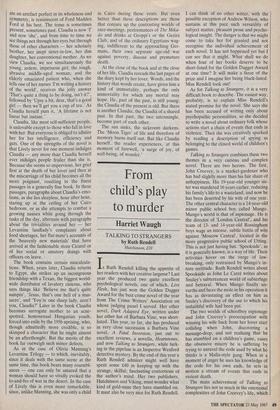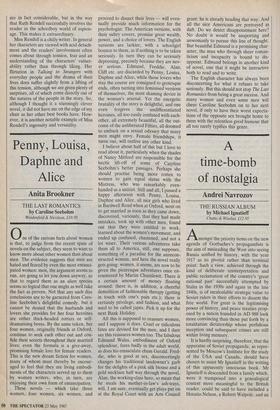From child's play to murder
Harriet Waugh
TALKING TO STRANGERS by Ruth Rendell Hutchinson, £10
s Ruth Rendell killing the appetite of her readers with her creative largesse? Last year she produced two quite excellent psychological novels, one of which, Live Flesh, has just won the Golden Dagger Award for the best crime novel of the year from The Crime Writers' Association on whose judging panel I served. Her other novel, Dark Adapted Eye, written under her other hat of Barbara Vine, was short- listed. This year, so far, she has produced in very close succession a Barbara Vine novel, A Fatal Inversion, just out to excellent reviews, a novella, Heartstones, and now Talking to Strangers, while lurk- ing in the pipeline is an Inspector Wexford detective mystery. By the end of this year a Ruth Rendell admirer might well have spent some £40 in keeping up with the strange, skilful, fascinating contortions of the author's mind. Her two publishers, Hutchinson and Viking, must wonder what kind of gold-mine they have stumbled on. It must also be very nice for Ruth Rendell. I can think of no other writer, with the possible exception of Andrew Wilson, who sustains at this pace such versatility of subject matter, pleasant prose and psycho- logical insight. The danger is that we might come to take her for granted and not recognise the individual achievement of each novel. It has not happened yet but I can see that it might. What shall we do when four of her books deserve to be short-fisted for the Golden Dagger Award at one time? It will make a farce of the prize and I imagine her being black-listed. Miss Rendell look out!
As for Talking to Strangers, it is a very difficult book to describe. The easiest way, probably, is to explain Miss Rendell's stated premise for the novel. She says she has been accused of writing only about psychopathic personalities, so she decided to write a novel about ordinary folk whose actions start a chain of events that ends in violence. Then she was creatively sparked by reading a description of spying as belonging to the closed world of children's games.
Talking to Strangers combines these two themes in a very curious and complex novel. There are two heroes. The first, John Creevey, is a market-gardener who has had slightly more than his fair share of unhappiness. His 19-year-old younger sis- ter was murdered 16 years earlier, reducing his family's life to a wasteland, and now he has been deserted by his wife of one year.
The other central character is a 14-year-old minor public school boy called Mungo.
Mungo's world is that of espionage. He is the director of 'London Central', and his team of 13- and 14-year-old Rossingham boys wage an intense, subtle battle of wits against 'Moscow Central', located in the more progressive public school of Utting. This is not just having fun. `Spookside, as it is generally known, is a way of life. Their activities hover on the verge of law- breaking, only restrained by Mungo's in- nate rectitude. Ruth Rendell writes about Spookside as John Le Cane writes about Smiley's subterranean world of subterfuge and betrayal. When Mungo finally un- earths and faces the mole in his operation it has as devastating an effect on him as Smiley's discovery of the use to which his unfaithful wife had been put.
The two worlds of schoolboy espionage and John Creevey's preoccupation with winning his wife back from her lover start colliding when John, discovering a message-drop, and not realising that he has stumbled on a children's game, eases the obsessive misery he is suffering by trying to unravel the code used by what he thinks is a Mafia-style gang. When in a moment of anger he uses his knowledge of the code for his own ends, he sets in motion a stream of events that ends in violent death.
The main achievement of Talking to Strangers lies not so much in the emotional complexities of John Creevey's life, which are in fact considerable, but in the way that Ruth Rendell successfully involves the reader in the schoolboy world of espion- age. This makes it extraordinary.
Miss Rendell is a chilly writer. In general her characters are viewed with acid detach- ment and the readers' involvement often comes about through tension, fear and an understanding of the characters' vulner- ability rather than through liking. Her flirtation in Talking to Strangers with everyday people and the drama of their lives does suffer slightly from a lifting of this tension, although we are given plenty of surprises, all of which come directly out of the natures of the people in the story. So, although I thought it a stunningly clever novel, it did not have me on the edge of my chair as her other best books have. How- ever, it is another notable example of Miss Rendell's ingenuity and versatility.










































































 Previous page
Previous page